TICAD8 Side-Event ~ reporting of the first session
- 2022.11.07
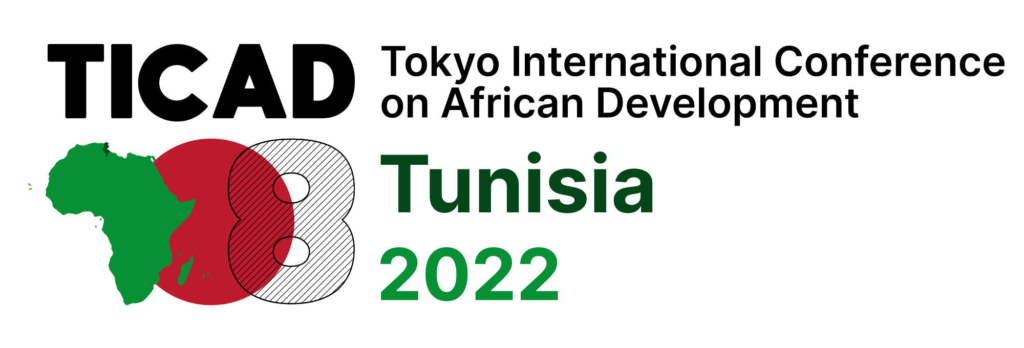
Hello everyone,
Early this year, Tokyo8 Global was accepted for two official side events by JICA, scheduled for the 19th and 30th of August 2022, to share our activities with our collaborators in Africa. You can find the recorded video of the first sessions on our YouTube channel in both English and Japanese. The second session can also be accessed in both English and Japanese.
A big shout out to the presenters who shared their experiences, as well as everyone who participated in the event. It was quite beyond our expectations. Here is a quick rundown of the webinar content.
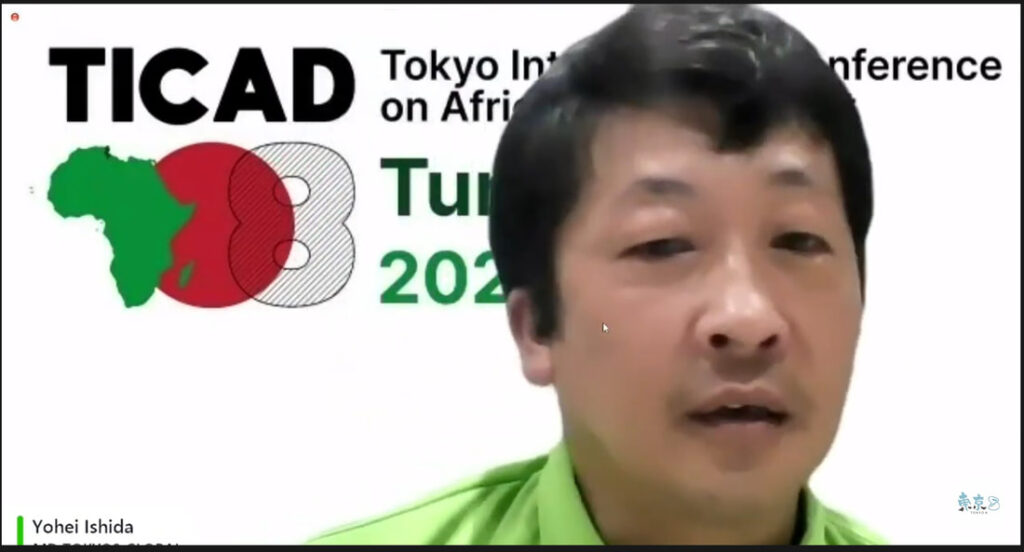
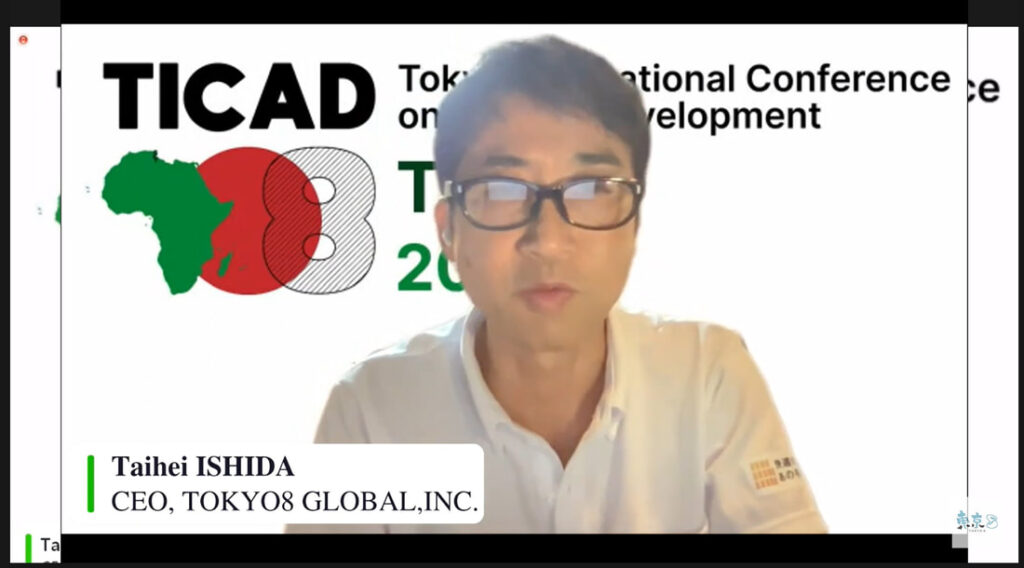
Mr Matsumoto, the executive of Tokyo8 Global and managing director of Assentia Holdings, was the moderator of the event. His welcome remarks included how our biofertilizer Tokyo8 would be a good support to different farming methods such as regenerative agriculture. He told how the Tokyo8 project was born from the global vision that the Late Former prime minister ABE Shizo had when he started the ABE Initiative, and we are determined to carry this vision forward. He also stated his hopes for agriculture in Africa and other developing countries.
The CEO of Tokyo8 Global and Taiyo-Yuka, M. Ishida Taihei, introduced Tokyo8 as a product of the company’s recycling activities. He stated the base philosophy behind our activities, which is to use waste considered as unuseful byproducts to make something of value that will improve society. He shared his vision for innovation and awareness of environmental and societal sustainability with the hope of empowering the most vulnerable communities and small-holder farmers.
The next remarks were from M. Ishida Yohei, the Managing Director of Tokyo8 Global, and Taiyo Yuka, who gave global information about Tokyo8 and our activities in 15 countries. Using our recycling know-how to improve agriculture globally by providing a product that gives results speedily and is affordable is our main strength. He quickly ran through the history of the biofertilizer and the uniqueness of its business model, which centers on local production and affordability. This is ideal for small-scale farming and low-income households. He also explained the mechanism by which Tokyo8 works in the soil to improve agricultural yield. His remarks were followed by reports from trials in Africa.
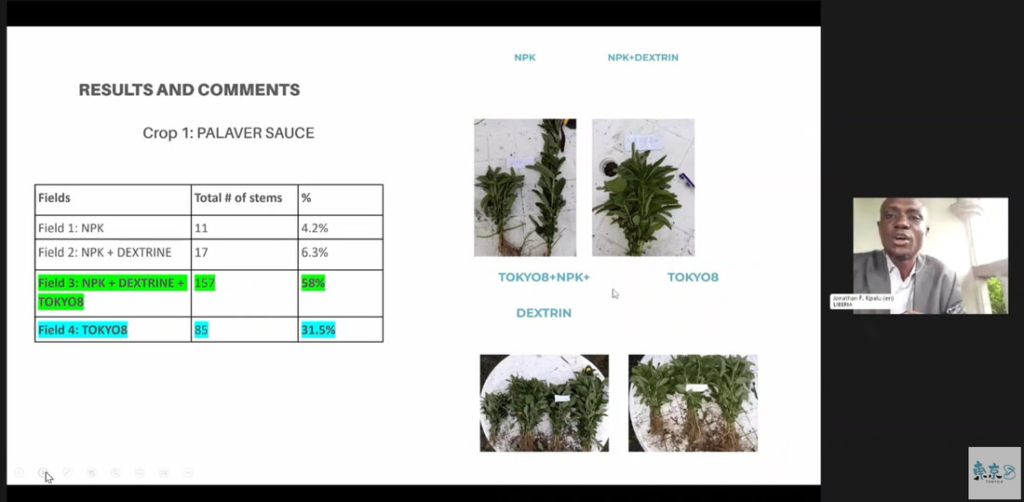
The first presentation was made by Mr Jonathan E. Kpalu from Liberia, an ex-ABE initiative participant. He presented an overview of agriculture in Liberia and stated his views on the many challenges met by the agricultural sector in Liberia as an opportunity for Tokyo8. He shared the upsides and challenges he and his team faced in the utilization of Tokyo8. He then summarized the procedures the team took in experimenting with the effectiveness of Tokyo8 on five crops; Okra, Cucumber, Palaver Sauce, Water Green, and Sweet Corn, grown on three different plots each. One plot had NPK only, another had NPK and Dextrin, a third had a mix of NPK (20%), Dextrin (20%), and Tokyo 8 (100%), and another only had Tokyo 8. The Sweet Corn, Palaver sauce, and Water Green grown on plots with the combination of Tokyo8, Dextrin, and NPK had the highest germination rate and yield. Cucumber and Okra performed best in plots with only Tokyo8. In Jonathan’s view, Tokyo8 will be necessary for the promotion of sustainable agriculture, enrichment of soils, and reduction of pesticide use. He sees Tokyo8 as environmentally friendly, good for biodiversity, and as a means of increasing productivity and income for farmers, an improvement for lowland farming. He concluded by stating the intention to conduct trials of Tokyo8 in rural Liberia and to build a Tokyo 8 production plant and include tests on tree crops.
The next presentation from Lesotho by Mr Tanki Mochochoko began with a brief introduction of the country’s topography, climate, economy and agriculture in general. They also gave a summary of their experiment, which they conducted on two Green Coronet Cabbage plots top-dressed using kraal manure, where one had Tokyo 8 and another had no Tokyo 8. The Lesotho team did not use any herbicide or pesticide. The cabbage grown with Tokyo8 matured earlier and had observably bigger cabbage heads as compared to the other cabbage. M. Tanki expressed his surprise at the difference in the cabbage sizes as he did not expect such results. It also seemed more juicy by appearance, even though he did not have the chance to cook and eat by himself. When taken to the market for sale, there was more demand for the cabbage grown with Tokyo8 as it was much better in appearance and weight. However, the area experienced flooding as such, they cannot conclusively determine the effects of Tokyo8 as running water had most possibly caused some leaching. Due to limited manpower, inadequate planning time, and flooding, the team was unable to take note of and measure all necessary variables. They plan to be more intentional with proper planning including flood resistance measures since flooding has become persistent in the country. They also plan to test on more crops, have some students recruited exclusively for the Tokyo8 project and to partner with people who have flood tunnels. Farmers who were introduced to Tokyo8 were very eager to get a hold of more Toky8. They intend to conduct a detailed need assessment survey and give some Tokyo8 to farmers for marketing and multiplier effect. He saw a need to establish a plant locally so they could serve the local demand.
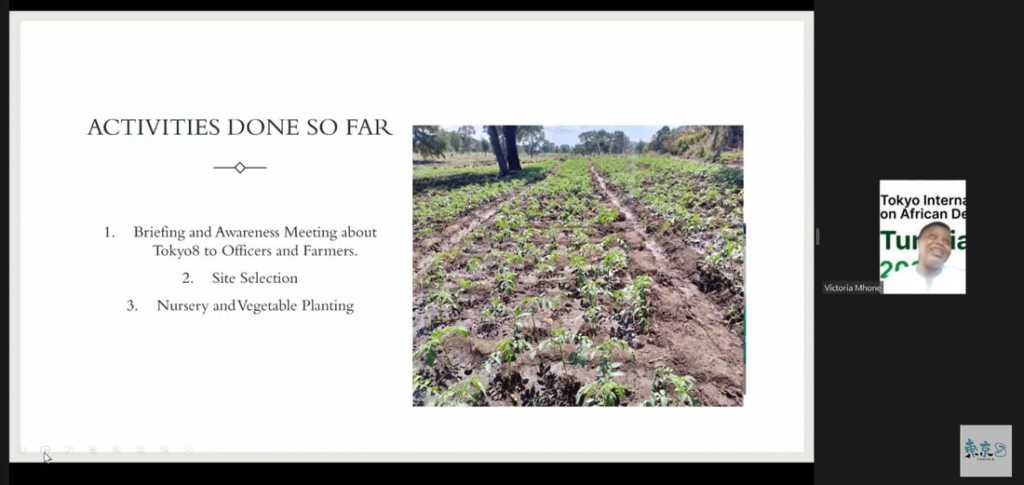
Next was a presentation from Malawi by Mrs Victoria Bweo Mhone who began by introducing the country’s climate, agriculture status and fertilizer access and usage. Even though the trials in Malawi did not reach the harvest stage, Victoria explained the progress done in Malawi so far in terms of performing trials on Tokyo8 on tomato and leafy green vegetables. Three plots were prepared, one on which Tokyo8 was used exclusively, on another usual inorganic fertilizer application was done, and in another, a combination of both Tokyo8 and inorganic fertilizer was used. She observed the fast growth of vegetables and a change in the coloring of the soil where Tokyo8 was applied. According to them, mixing with manure gives the best results. According to Victoria, Tokyo8 is a good way to reduce food production costs as there will be an increased use of locally produced manure, a reduction in the usage of chemical fertilizers, and a reliance on imports. She believes that with the use of Tokyo8, a time will soon come when farmers will stop using chemical fertilizers. Tokyo8 is good for maintaining and improving soil health and quality and hastens the decomposition of manure. She found it easy to produce locally such that all the materials she used were sourced in her township. She plans to conduct another experiment design that will test the effects of combined Tokyo8 with kraal manure and another to test Tokyo8 and reduced fertilizer quantity. She concluded by stating the main challenge faced by the Malawi team, which is the high costs of harboring research for one and a half years (three planting seasons), as a policy requirement in Malawi before having Tokyo8 authorized for use in the country. She is unable to meet the current demand and is facing mobility challenges to deliver the product and train farmers in the use of Tokyo8. Victoria believes that Tokyo8 is a key to her passion to improve the livelihoods of farmers. As such, she plans to get certification, install a production plant, and supply throughout the northern region as well as other parts of the country.
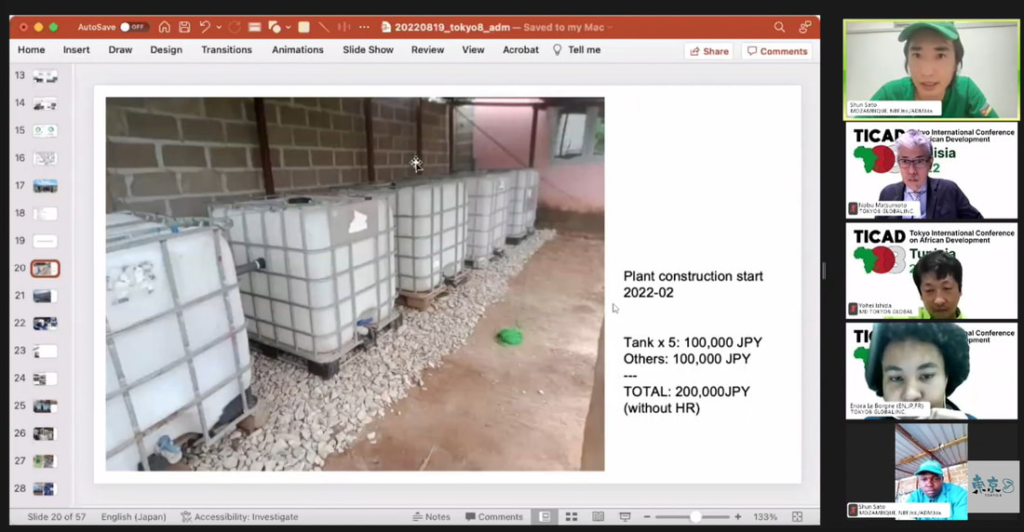
The last presentation from Mozambique was done by Mr. Sato, who represented Nippon Biodiesel Fuel (NBF) Ltd/ADm, Ida, a company that focuses on energy, food, and finance in cooperation with local communities, businesses, and the government. He began by introducing the work done by his affiliated company and the strides taken so far in promoting agriculture. Unlike other countries, the team in Mozambique has not conducted trials on plants yet but has managed to set up a production plant, which they started this year, and have now completed at a total material cost of JPY200,000. The main challenge they have faced thus far is finding the right kind of pipes and connectors fit for the task and at a good price. For products that were very hard to find, they improvised with locally found materials. They have successfully produced Tokyo8 using local materials and are now set to begin trials. The Mozambique team showed us a video of the tanks that have been set up. To be safe from power outages, the Mozambique team proposed the use of solar for electricity to escape from unwanted power outages. He is positive and enthusiastic, especially as inspired by other presenters.
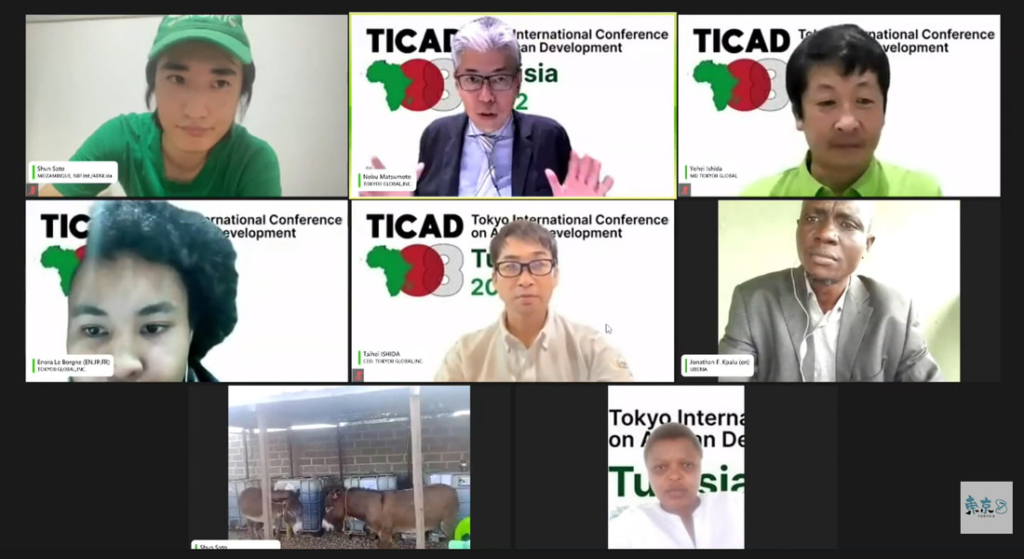
In the Q&A session, questions included clarity on the mechanism of Tokyo8, the difference in the quality of Tokyo8 based on the type of manure used, reasons for the difference in germination rate when Tokyo8 is used exclusively and when used with other products, as well as the quantity of manure needed and storage inconveniences. Due to limited time, other questions were posed on the website, and yet others were asked in the follow-up session. Please see the YouTube video for more details. Remember to like and subscribe here.
